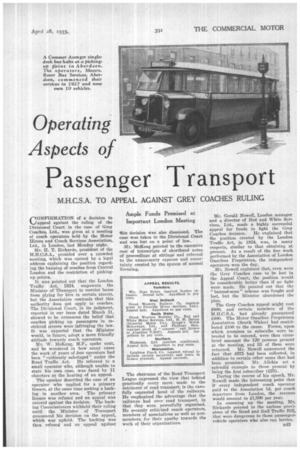Operating Aspects of
Page 61

If you've noticed an error in this article please click here to report it so we can fix it.
Passenger Transport
M.H.C.S.A. TO APPEAL AGAINST GREY COACHES RULING
CONFIRMATION of a decision to appeal against the ruling of the Divisional Court in the case of Grey Coaches, Ltd., was given at a meeting of coach operators held by the Motor Hirers and Coach Services Association, Ltd., in London, last Monday night.
Mr. H. T. Rickards, president of the M.H.O.S.A., presided over a crowded meeting, which was opened by a legal address explaining the position regarding the banning of coaches from Central London and the .restriction of pickingup points.
It was pointed out that the London Traffic Act, 1924, empowers the Minister of Transport to restrict buses from plying for hire in certain streets, but the Association contends that this authority does not apply to coaches. The Divisional Court, in its judgment, reported in our issue dated March 31, showed to be erroneous the belief that coaches picking up passengers in restricted streets were infringing the law. It was expected that the Minister would, in future, adopt a more friendly attitude towards coach operators.
Mr. W. McKeag, M.P., spoke next, and he wondered in how many cases the work of years of bus operators had been "ruthlessly sabotaged" under the Road Traffic Act, He referred to a small operator who, although unable to state his own case, was faced by 11 objectors at the hearing of an appeaL The speaker described the case of an operator who applied for a primary licence, at the same time seeking a backing in another area. The primary licence was refused and an appeal was entered against the decision. The backing Commissioners withheld their ruling until the Minister of Transport a-nnounced his decision on the appeal, Which was upheld. The backing was then refused and an appeal against
This decision was also dismissed. The ease was taken to the Divisional Court and was lost on a point of law.
Mr. McKeag pointed to the excessive cost of transcripts of shorthand notes of proceedings at sittings and referred to the unnecessary expense and uncertainty created by the system of annual licensing.
The chairman of the Road Transport League expressed the view that behind practically every move made to the detriment of road transport, is the carefully concealed hand of the railways. He emphasized the advantage that the railways had over road transport, in that they were powerfully organized. He severely criticized coach operators, members of associations as well as nonmembers, for their apathy towards the work of their organizations.
Mr. Gerald Nowell, Loudon manager and a director of Red and White Ser. vices, Ltd., made a highly successful appeal for funds to fight the Grey Coaches decision.He explained that the position created by the London Traffic Act, in 1924, was, in many respects, similar to that obtaining at present. As a result of the fine work performed by the Association of London Omnibus Proprietors, the independent operators won the day.
Mr. Nowell explained that, even were the Grey Coaches case to be lost in the Appeal Court, the position would be considerably better than if no tight were made. He pointed out that the "banned-zone" scheme was fought and lost, but the Minister abandoned the plan.
The Grey Coaches appeal might cost £800, and certain members of the M.H.C.S.A. had already guaranteed £400. The Motor Omnibus Proprietors Association (South Wales) had contributed £100 to the cause. Forms, uponwhich promises to subscribe were intended to be entered, were then circulated amongst the 120 persons present at the meeting, and 55 of them were returned. Mr. Nowell announced the fact that £675 had been collected, in addition to certain other sums that had been promised. Mr. Allchin set a splendid example to those present by being the first subscriber (£25).
During the course of his speech, Mr. Nowell made the interesting point that if every independent coach operator paid to the Association id. per coach departure from London, the revenue would amount to £1,500 per year.
In slimming up the meeting, Mr. Rickards pointed to the various provisions of the Road and Rail Traffic Bill, that were dangerous to those passenger. vehicle operators who also ran lorries.




































































































